高中英语狂K语法——句法篇:八、特殊句式含解析
高考英语二轮专题总复习 语法精选讲义第八部分特殊结构

2012届高考英语二轮专题总复习语法精选讲义第八部分特殊结构倒装 (1)1、部分倒装(助动词倒装)是指把谓语的一部分(助动词)提到主语的前面。
例:Never in my life have I seen such a thing.1)句首为否定词或否定意义的词语时,句子要部分倒装( not , not only , never , little , seldom , hardly... )2)hardly ( scarcely ) , no sooner 引导的部分在句首要部分倒装。
3)not only ... but also ... 引导两个并列句,前倒后不倒。
4)only在句首引导状语,或Not until 引导的状语在句首,主句要部分倒装。
5)if 从句中如有 were ( had , should ) , if 省去后,要部分倒装。
6)as 引导的让步状语从句,要部分倒装表语、状语倒装)。
7)状语位于句首表示强调或使句子平衡,或使上下文紧密衔接,句子要部分倒装.8) so … that … 结构中,如果so在句首,主句要部分倒装。
注意,so必须和它修饰的形容词或副词一道移至句首。
倒装 (2)2、完全倒装(主谓倒装是指把谓语全部提到主语的前面。
例:In a lecture hall of a university in England sits a professor.1)由here , there , now , then ... 引导的句子,要完全倒装。
2)句首是拟声词、直接引语或 away , down ,out, in, up等副词,句子要完全倒装。
(以上两种情况中的主语如是代词则不倒装)3)介词短语作地点状语在句首,句子要完全倒装。
4) 当形容词、过去分词、介词短语做表语位于句首时,要完全倒装。
Present at the meeting were Professor White, Professor Smith and many other guests.Gone are the days when they could do what they liked to the Chinese people.Among the goods are Christmas trees, flowers, candles and toys.5)So do ( am ) I . 或Nor ( Neither) do (am ) I. 是完全倒装,其主句与前一句的主语各是一人。
高考英语语法特殊句子汇总

高考英语语法特殊句子汇总高考英语语法是考生必须要掌握的重要内容之一。
在高考英语中,语法的正确运用可以帮助考生提升阅读理解、完形填空、短文改错和写作等题型的得分。
其中,特殊句子是语法中的一个重点。
下面将详细介绍一些高考英语中常见的特殊句子及其用法。
一、倒装句1. 全部倒装句:主语位于谓语动词之后,常用于表示否定、条件、半倒装和祝愿等情况下。
例句:Not only does he study hard, but also he helps others.2. 部分倒装句:谓语动词前的助动词、系动词或情态动词放在主语之前,常用于表示祝愿、建议、要求、命令和表语从句的应该、能够等情况下。
例句:Little did I know about the difficulties they were facing.二、强调句1. 强调句的基本结构为“It is/was + 被强调部分 + that/who + 句子的其他部分”,常用于对某个人、事物或情况进行强调。
例句:It was in the park that I met my old friend.2. 对特定词进行强调时,使用特殊的结构“it is/was + 被强调部分 + (who/that) + 其他成分”,常用于对时间、地点、原因和方式等进行强调。
例句:It was because of his help that I finished the project on time.三、虚拟语气1. 条件句中的虚拟语气:表示与事实相反的假设,条件从句用过去完成时,主句用“would/could/should/might + have + 过去分词”的形式。
例句:If I had studied harder, I would have passed the exam.2. 虚拟语气在宾语从句中的应用:表示愿望、建议、要求等,表达方法为:should + 动词原形,或动词原形前加动词的一般过去式。
高中英语高考英语句子成分句法分析词类剖析.

★ We
study English. ★ He is asleep. ★ You may go now.
(二)练习
主 谓语
说出下列划线部分单词或词组在句子 中各充当什么成分
宾语 定语
1. I don't like the picture on the wall. 2. My brother hasn't done his homework.
主语 谓语 定语
3. It is a great pleasure to talk with you .
选择 疑问句 以or连接提问的两个部分,以供选择。 他不喜欢足球,是吗? Is he a student or a worker? 他是学生还是工人?
(三)祈使句:用来表示命令或请求,说话的对象是第二人称you,
但常常被省略 。常用动词原形开头。否定祈使句在句首加don’t
Eg. Sit down, please!
主语+及物动词+宾语+宾语补足语
He found the old man dead.
(二)并列句:用并列连词把两个或两个以上的 简单句连接起来的句子。并列连词有and,but,or 等。 Eg. He is a student and I am a teacher.
He likes football, but I like basketball.
(三)复合句:一个句子里又包含一个或多个句子 充当成分的句子。大句子叫主句,充当成分、附属 于大句子的句子叫从句。
高中英语八大语法全解析
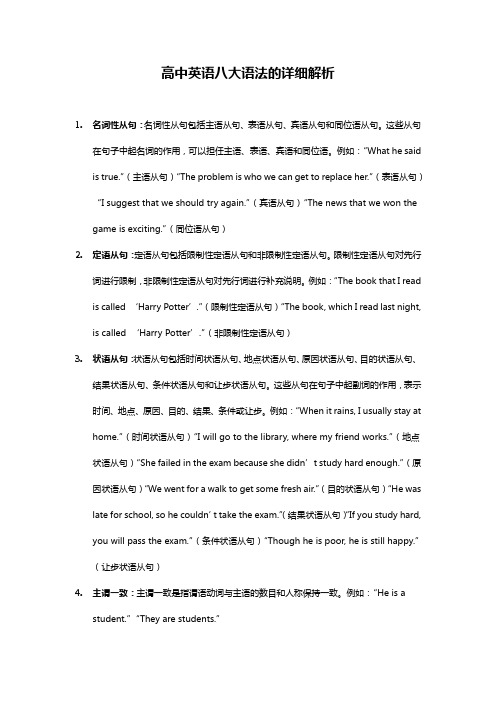
高中英语八大语法的详细解析1.名词性从句:名词性从句包括主语从句、表语从句、宾语从句和同位语从句。
这些从句在句子中起名词的作用,可以担任主语、表语、宾语和同位语。
例如:“What he said is true.”(主语从句)“The problem is who we can get to replace her.”(表语从句)“I suggest that we should try again.”(宾语从句)“The news that we won the game is exciting.”(同位语从句)2.定语从句:定语从句包括限制性定语从句和非限制性定语从句。
限制性定语从句对先行词进行限制,非限制性定语从句对先行词进行补充说明。
例如:“The book that I read is called ‘Harry Potter’.”(限制性定语从句)“The book, which I read last night, is called ‘Harry Potter’.”(非限制性定语从句)3.状语从句:状语从句包括时间状语从句、地点状语从句、原因状语从句、目的状语从句、结果状语从句、条件状语从句和让步状语从句。
这些从句在句子中起副词的作用,表示时间、地点、原因、目的、结果、条件或让步。
例如:“When it rains, I usually stay at home.”(时间状语从句)“I will go to the library, where my friend works.”(地点状语从句)“She failed in the exam because she didn’t study hard enough.”(原因状语从句)“We went for a walk to get some fresh air.”(目的状语从句)“He was late for school, so he couldn’t take the exam.”(结果状语从句)“If you study hard, you will pass the exam.”(条件状语从句)“Though he is poor, he is still happy.”(让步状语从句)4.主谓一致:主谓一致是指谓语动词与主语的数目和人称保持一致。
高中英语特殊句式全面讲解及练习含答案
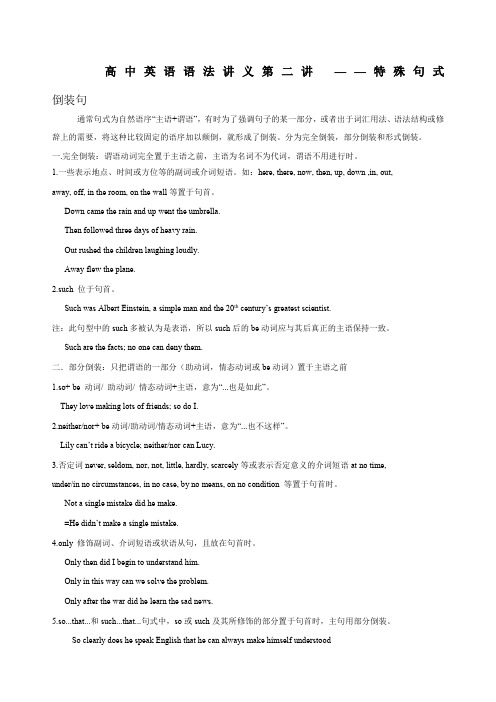
高中英语语法讲义第二讲——特殊句式倒装句通常句式为自然语序“主语+谓语”,有时为了强调句子的某一部分,或者出于词汇用法、语法结构或修辞上的需要,将这种比较固定的语序加以颠倒,就形成了倒装。
分为完全倒装,部分倒装和形式倒装。
一.完全倒装:谓语动词完全置于主语之前,主语为名词不为代词,谓语不用进行时。
1.一些表示地点、时间或方位等的副词或介词短语。
如:here, there, now, then, up, down ,in, out,away, off, in the room, on the wall等置于句首。
Down came the rain and up went the umbrella.Then followed three days of heavy rain.Out rushed the children laughing loudly.Away flew the plane.2.such 位于句首。
Such was Albert Einstein, a simple man and the 20th century’s greatest s cientist.注:此句型中的such多被认为是表语,所以such后的be动词应与其后真正的主语保持一致。
Such are the facts; no one can deny them.二.部分倒装:只把谓语的一部分(助动词,情态动词或be动词)置于主语之前1.so+ be 动词/ 助动词/ 情态动词+主语,意为“...也是如此”。
They love making lots of friends; so do I.2.neither/nor+ be动词/助动词/情态动词+主语,意为“...也不这样”。
Lily can’t ride a bicycle; neither/nor can Lucy.3.否定词never, seldom, nor, not, little, hardly, scarcely等或表示否定意义的介词短语at no time,under/in no circumstances, in no case, by no means, on no condition 等置于句首时。
高考英语 第八章 非谓语动词知识精讲
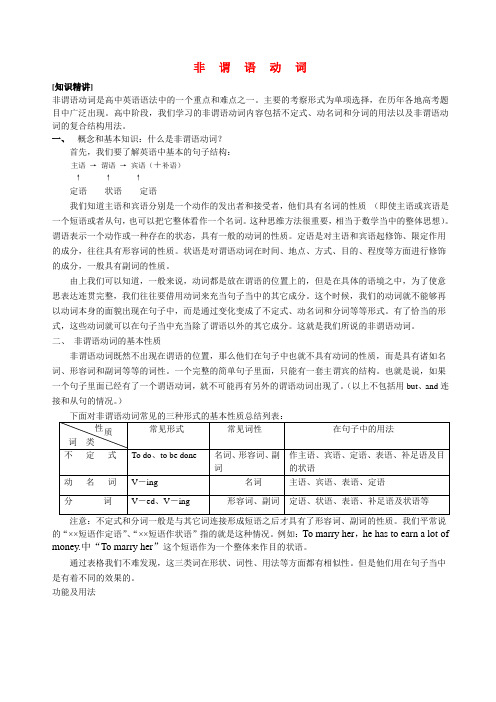
非谓语动词[知识精讲]非谓语动词是高中英语语法中的一个重点和难点之一。
主要的考察形式为单项选择,在历年各地高考题目中广泛出现。
高中阶段,我们学习的非谓语动词内容包括不定式、动名词和分词的用法以及非谓语动词的复合结构用法。
一、概念和基本知识:什么是非谓语动词?首先,我们要了解英语中基本的句子结构:主语→ 谓语→宾语(+补语)↑ ↑ ↑定语状语定语我们知道主语和宾语分别是一个动作的发出者和接受者,他们具有名词的性质(即使主语或宾语是一个短语或者从句,也可以把它整体看作一个名词。
这种思维方法很重要,相当于数学当中的整体思想)。
谓语表示一个动作或一种存在的状态,具有一般的动词的性质。
定语是对主语和宾语起修饰、限定作用的成分,往往具有形容词的性质。
状语是对谓语动词在时间、地点、方式、目的、程度等方面进行修饰的成分,一般具有副词的性质。
由上我们可以知道,一般来说,动词都是放在谓语的位置上的,但是在具体的语境之中,为了使意思表达连贯完整,我们往往要借用动词来充当句子当中的其它成分。
这个时候,我们的动词就不能够再以动词本身的面貌出现在句子中,而是通过变化变成了不定式、动名词和分词等等形式。
有了恰当的形式,这些动词就可以在句子当中充当除了谓语以外的其它成分。
这就是我们所说的非谓语动词。
二、非谓语动词的基本性质非谓语动词既然不出现在谓语的位置,那么他们在句子中也就不具有动词的性质,而是具有诸如名词、形容词和副词等等的词性。
一个完整的简单句子里面,只能有一套主谓宾的结构。
也就是说,如果一个句子里面已经有了一个谓语动词,就不可能再有另外的谓语动词出现了。
(以上不包括用but、and连接和从句的情况。
)注意:不定式和分词一般是与其它词连接形成短语之后才具有了形容词、副词的性质。
我们平常说的“××短语作定语”、“××短语作状语”指的就是这种情况。
例如:To marry her,he has to earn a lot of money.中“To marry her”这个短语作为一个整体来作目的状语。
(完整版)高考英语特殊句式经典讲解
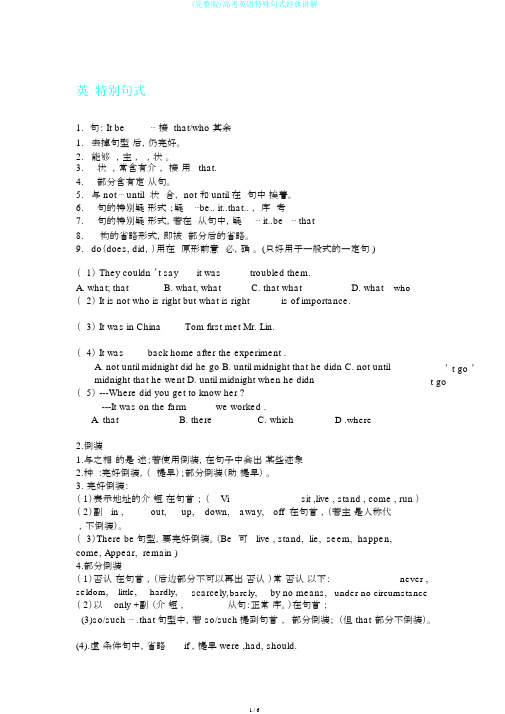
英特别句式1.句: It be⋯接that/who其余1.去掉句型后,仍完好。
2.能够,主,,状。
3.状,常含有介,接用 that.4.部分含有定从句。
5.与 not ⋯ until状合, not 和 until 在句中挨着。
6.句的特别疑形式;疑⋯be.. it..that.. ,序考7.句的特别疑形式,若在从句中,疑⋯ it..be ⋯ that8.构的省略形式,即被部分后的省略。
9.do(does, did,)用在原形前意必,确。
(只好用于一般式的一定句 )(1) They couldn ’t say ___it was _____troubled them.A. what; thatB. what, whatC. that whatD. what who (2) It is not who is right but what is right _____ is of importance.(3) It was in China ____Tom first met Mr. Lin.(4) It was ____back home after the experiment .A. not until midnight did he goB. until midnight that he didnC. not until midnight that he wentD. until midnight when he didn’ t go ’t go(5) ---Where did you get to know her ?---It was on the farm _____we worked .A. thatB. thereC. which D .where2.倒装1.与之相的是述;若使用倒装,在句子中会出某些迹象2.种 :完好倒装,(提早);部分倒装(助提早)。
3. 完好倒装:( 1)表示地址的介短在句首;( Vi sit ,live , stand , come , run )( 2)副 in , out,up, down, away, off 在句首,(若主是人称代,不倒装)。
2022高考英语考前冲刺精选:资特殊句式(解析)

2022高考英语考前冲刺精选:资特殊句式(解析)一、简单句只有一个主语(或并列主语)和一个谓语(或并列谓语)的句子叫简单句。
按照句子的功能,简单句可分为4类:陈述句、疑问句、祈使句、感叹句。
其中陈述句中的否定式、疑问句中的反意疑问句以及感叹句的结构多为考查重点,应重点把握。
以下将对此作重点分析。
1.陈述句陈述句包括确信式和否定式两种(确信式暂略)。
注意以下有关否定结构的问题:He had hardly any schooling before liberation.Not both of them want to go.(=Both of them don’t want to go.)All that glitters is not gold.None of these answers are/is correct.We don’t believe that he can do that.—Is Xiao Ming coming?—I don’t suppose so./I suppose not./I suppose so.hope和be afraid的确信和否定答语分别为:I hope so./I hope not.及I’m afraid so./I’m afraid not.2.疑问句疑问句分为一样疑问句、专门疑问句、选择疑问句和反意疑问句。
现要紧介绍反意疑问句构成。
形式:句子+简短的疑问句(1)前面若有多个句子并列,则以最后一个句子为准;若前面部分为主从复合句,一样来说,以主句为准;但若主从复合句的主句谓语动词是think,believe,suppose,guess等,主语又是第一人称且为一样现在时、谓语又没有任何副词修饰时,简短疑问部分的动词、时态、人称则以从句为准,而肯、否定形式依主句而定。
(2)前面句子含有must,can’t,may等表估量的词时,疑问部分则依据句子的时态及时刻状语而定。
超实用高考英语复习:重难点08语法必考点八 特殊句式(教师版)(全国通用)

重难点08 特殊句式距离高考还有一段时间,不少有经验的老师都会提醒考生,愈是临近高考,能否咬紧牙关、学会自我调节,态度是否主动积极,安排是否科学合理,能不能保持良好的心态、以饱满的情绪迎接挑战,其效果往往大不一样。
以下是本人从事10多年教学经验总结出的以下学习资料,希望可以帮助大家提高答题的正确率,希望对你有所帮助,有志者事竟成!养成良好的答题习惯,是决定高考英语成败的决定性因素之一。
做题前,要认真阅读题目要求、题干和选项,并对答案内容作出合理预测;答题时,切忌跟着感觉走,最好按照题目序号来做,不会的或存在疑问的,要做好标记,要善于发现,找到题目的题眼所在,规范答题,书写工整;答题完毕时,要认真检查,查漏补缺,纠正错误。
总之,在最后的复习阶段,学生们不要加大练习量。
在这个时候,学生要尽快找到适合自己的答题方式,最重要的是以平常心去面对考试。
英语最后的复习要树立信心,考试的时候遇到难题要想“别人也难”,遇到容易的则要想“细心审题”。
越到最后,考生越要回归基础,单词最好再梳理一遍,这样有利于提高阅读理解的效率。
另附高考复习方法和考前30天冲刺复习方法。
近五年高考语法填空对特殊句式的考查很少,但考生在备考中仍需掌握There be句型、祈使句、状语从句的省略、强调句、倒装句等知识点,以便有充足的知识储备和较强的综合能力应对高考。
技巧1熟记句型结构1. — Do you understand the meaning of the sentence?— Sorry, ______ . Would you please explain it again?A.I didn’t get it B.I don’t knowC.I’m not in the mood for it D.I don’t agree with【解析】考查交际用语。
句意:——你明白这个句子的意思吗?——抱歉,我没听懂。
请你再解释一遍好吗? A. I didn’t get it我没听懂;B. I don’t know我不知道;C. I’m not in the mood for it我没心情;D. I don’t agree with我不同意。
高中英语语法—句法结构及句子成分知识点讲解

高中英语语法—句法结构及句子成分知识点讲解十大词类与八大句子成分的关系(1)十大词类:据英语单词所表达的含义以及在句子中的作用,把英语单词分为10个类别,就是10大词类:名词、代词、数词、动词、副词、形容词、冠词、介词、连词、感叹词。
根据部分词类具有的共同特征,又将十大词类分为两大部分:实词:名词、代词、数词、动词、副词、形容词。
特征:具有完整的词义;能够在句子中独立充当句子成分。
虚词:冠词、介词、连词、感叹词。
特征:没有完整的意思;不能够在句子中独立充当句子成分,必须和实词搭配,才能充当句子成分。
十大词类和八大句子成分(2)八大句子成分:句子成分:组成英语句子的各个部分,叫做句子成分。
英语的句子最多由八个句子成分组成,即主语、谓语、宾语、表语、定语、状语、宾语补足语以及同位语。
★主语:概念:句子的主体,发出动作的人或物,表示所说的是谁或是什么。
位置:主语一般在句首,特殊句型中在句末(如用it充当形式宾语,把真正的主语放在后面)。
构成:由名词(短语)、代词、动名词、动词不定式或从句充当。
例:Henry is a good boy.亨利是个好孩子。
He ran away.他跑掉了。
To learn a foreign language is not easy.学习一门外语不容易。
Driving to Beijing is not difficult.开车去北京不难。
What has happened proves that our policy is right. 发生的一切证明我们的政策是对的。
Whether we’ll go depends on the weather. 我们是否去要看天气。
★谓语:概念:说明主语的动作、特征、状态等的句子成分,叫做谓语。
位置:谓语动词通常位于主语之后,特殊句型(倒装句)位于主语之前。
构成:由动词或动词短语充当。
动词分为:实义动词、连系动词、情态动词和助动词。
高中英语特殊句式考情解读与重点知识梳理

高中英语特殊句式考情解读与重点知识梳理从近几年高考试题来看,特殊句式主要考查倒装句、省略句和强调句的用法。
命题的着重点在以下几个方面:1.考查倒装句式,特别注意以下三种情况:(1)含有否定意义的词置于句首时,部分倒装。
(2)only 位于句首修饰状语等,部分倒装。
(3)so/such...that 句型中,so/such 位于句首时,后面的主句倒装,that 从句不倒装。
2.考查省略句的构成,尤其是以下四种情况:(1)省略主语、主语和谓语、主语和谓语的一部分。
(2)状语从句省略为“连词+非谓语动词”形式,务必要明确句子主语与非谓语动词的逻辑关系以及非谓语动词与谓语的时间关系。
(3)不定式的省略。
(4)not,so,neither,nor 的“替代性”省略。
3.考查强调句型的构成和强调谓语的方法。
近几年高考更加注重考查知识之间的交叉现象,加大了综合考查语法知识的力度,以下几个方面要引起高度重视:(1)强调句型的一般疑问句式和特殊疑问句式的构成。
(2)强调not...until...句型的特殊构成方式。
(3)把强调句型与定语从句、省略句以及强调句型与时间状语从句、地点状语从句的考查等融合到一起考查学生综合把握语法知识的能力。
知识点一、倒装句(一)完全倒装(Full Inversion)谓语动词完全放在主语之前的句子便是完全倒装句。
这类句型主要有:1.表示方式、方位的副词或介词短语,如here, there, up, down, in, away, off, out, in the room, on the wall 等,置于句首,且主语是名词时。
如:In a lecture hall of a university in England sits a professor.在英格兰一所大学的讲堂里坐着一位教授。
South of the river lies a small factory.一个小型工厂坐落在河的南岸。
高考英语语法专攻-《特殊句型》-考点归纳+针对性练习
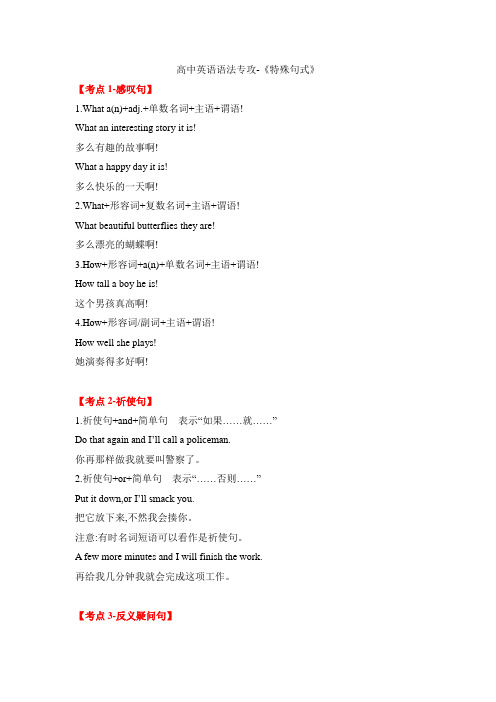
高中英语语法专攻-《特殊句式》【考点1-感叹句】1.What a(n)+adj.+单数名词+主语+谓语!What an interesting story it is!多么有趣的故事啊!What a happy day it is!多么快乐的一天啊!2.What+形容词+复数名词+主语+谓语!What beautiful butterflies they are!多么漂亮的蝴蝶啊!3.How+形容词+a(n)+单数名词+主语+谓语!How tall a boy he is!这个男孩真高啊!4.How+形容词/副词+主语+谓语!How well she plays!她演奏得多好啊!【考点2-祈使句】1.祈使句+and+简单句表示“如果……就……”Do that again and I’ll call a policeman.你再那样做我就要叫警察了。
2.祈使句+or+简单句表示“……否则……”Put it down,or I’ll smack you.把它放下来,不然我会揍你。
注意:有时名词短语可以看作是祈使句。
A few more minutes and I will finish the work.再给我几分钟我就会完成这项工作。
【考点3-反义疑问句】1.当陈述部分带有宾语从句时,反意疑问部分的主语与谓语常和主句保持一致。
He said that they would come to my birthday party,didn’t he?他说他们要来参加我的生日聚会,是吗?2.当陈述部分主句的谓语动词是think,believe,suppose,guess,expect,imagine,且主句主语为第一人称时,反意疑问部分的主语和谓语与宾语从句的主语和谓语保持一致;当陈述部分主句的主语为第二、三人称时,后面的疑问部分的主语和谓语与主句的主语和谓语保持一致。
They don’t believe he will succeed,do they?他们不相信他会成功,是吗?3.当陈述部分带有seldom,hardly,scarcely,never,few,little,nothing,nobody等否定词时,反意疑问部分用肯定形式。
精品高中英语狂K语法——句法篇:一、句子成分Word版含解析

1 主语主语(subject) 是一个句子的主题( theme),是句子所述说的主体。
它的位置一般在一句之首。
可用作主语的有单词、短语、从句乃至句子。
1.名词作主语如:A tree has fallen across the road. (一棵树倒下横在路上。
)2.代词作主语如:You’re not far wrong. (你差不多对了)。
He told a joke but it fell flat. (他说了个笑话,但没有引人发笑)3.数词作主语如:Three is enough. 三个就够了。
Four from seven leaves three. 7减4余3。
4.名词化的形容词用作主语The idle are forced to work. 懒汉被迫劳动。
Old and young marched side by side. 老少并肩而行。
5.副词作主语如:Now is the time. 现在是时候了。
Carefully does it. 小心就行。
6.名词化的介词作主语如:The ups and downs of life must be taken as they come. 我们必须承受人生之沉浮。
7.不定式用作主语如:To find your way can be a problem.你能否找到路可能是一个问题。
It would be nice to see him again. 如能见到他,那将是一件愉快的事。
8. 动名词用作主语如:Smoking is bad for you. 吸烟对你有害。
Watching a film is pleasure, making one is hard work. 看电影是乐事,制作影片则是苦事。
9. 名词化的过去分词用作主语如:The disabled are to receive more money. 残疾人将得到更多的救济金。
英语语法趣味解读高中英语八大句子成分

【英语语法】趣味解读高中英语八大句子成分无论是“理解”还是“表达”,均需建立在准确理解句子成分基础上。
若没有没有理解句子成分,就会感到一个句子杂乱无章,不知所云。
所以,学好语法,应从正确划分句子成分入手。
众所周知,句子有若干个组成部分,它们分别承担着不同的作用,组成句子的各个部分叫作句子成分。
英语中的句子成分分为主语(subject)、谓语(predicate)、宾语(object)、表语(predicative)、定语(attribute)、状语(adverbial)、补语(complement)和同位语(appositive)八种。
一、主语习惯于发号施令,偶尔也会被赶下台在句子中,主语是执行句子的行为或动作的主体。
主语一般位于句子开头,且不能省略。
但在某些特定的句式里,如:疑问句、倒装句、祈使句、感叹句等,句子主语也可以“下台”位于谓语动词之后或省略。
能够充当主语的主要有名词(短语)、代词、数词、动名词(短语)、动词不定式(短语)和从句等。
例句1. The route went from our school gate to the foot of the South Mountain. (名词作主语)2. Taking part in a fruit picking activity on a farm is meaningful and rewarding. (动名词短语作主语)3. To start with, what I intend to stress is that we are about to start our next lesson in Classroom 8 of the Teaching Building at 10 a.m. next Friday. (从句作主语)4. The competition will begin at 2 p.m. and last for roughly 3 hours. (名词作主语)5. To let China go to the world and let the world understand China is my first aim. (不定式短语作主语)6. It seems to me that the traditional Chinese dress will make the occasion very Chinese-style and inviting to the British students. (代词it充当形式主语,that引导的主语从句作真正的主语。
高中英语语法特殊句式(倒装、省略、强调)
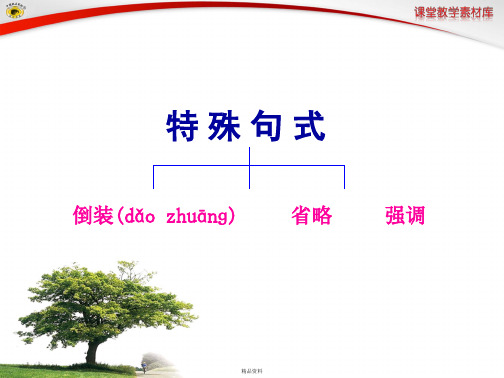
3.在对话或并列句中,如果主语(zhǔyǔ)、谓语不同,而宾语相同, 则常省去相同的宾语部分。 Tom enjoys dancing, but Peter hates (dancing).
精品资料
4.省略作宾语的不定式短语,只保留to,但如果该宾语是动词 be或完成时态,则须在之后加上be或have: —Are you going there? —Yes, I’d like to (go there). 注意(zhù yì):在下列词后常省略不定式但要保留to: want, wish, like, hate, hope, intend, plan, love, refuse, expect,但当 want 和like用于从句中时,to常常省略。
My office was on the tenth floor, and his (office was) on the twelfth (floor). 并列句的省略有时还可出现在前面(qián mian)的分句 中,这时被省略的词语便出现在下文。
精品资料
5.only + 状语(zhuàngyǔ)(副词、介词短语、状语(zhuàngyǔ)从句)放在句首时 。(部分倒装) 1)Only then did I realize the value of reading aloud every morning. 2)Only by means of talking can we avoid misunderstanding each other.
精品资料
2.方位词in, out, there, here, inside, outside, up, down, away, off, downstairs, upstairs等以及now, then置于句首时,谓语动词常用 be, come, go, lie, run等,并且句子的主语(zhǔyǔ)是名词。为以示 强调或为了使情景更生动, 要全部倒装。(全部倒装) 1) Away flew the bird which I bought yesterday. 2) Now comes your turn to sweep the floor. 注意: 主语(zhǔyǔ)是人称代词时,仍用自然语序。 Away they went. (=They went away.)
高中英语语法之特殊句式的结构

特殊句式的结构1.It结构一、强调句强调句的基本句型是“It is/was+被强调的部分+that/who+其他部分”。
被强调的部分可以是主语、宾语和状语等。
强调句型的使用特点主要有以下几个方面:(1)被强调的是状语或状语从句时,要用that引导从句,而不能用which,而且通常不能省略。
(2)被强调的是人时,引导词可用who,也可用that。
Was it you that/who let out the secret to her?是你把这个秘密泄露给她的吗?(3)被强调的不管是单数还是复数名词,主句的be动词都用单数is或was。
It was Marie Curie and her husband who discovered radium.是居里夫人和她的丈夫发现了镭。
It is the PLA men who/that are safeguarding our country day and night.是解放军战士日夜保卫着我们的祖国。
(4)对not...until时间状语从句进行强调时,其句型是:It is/was not until...that从句,即not和until在强调句中总是紧挨着的。
注意习惯上不用not till,而且从句不能用when引导。
It was not until the last operation was finished that Bethune left the battle hospital.(5)强调句的疑问形式:When was it that he made up his mind to take this course?他是什么时候决定选修这一门课程的?Why is it that he doesn’t like th e book?他为什么不喜欢这本书?Was it in 1939 that the Second World War broke out?(6)强调句型与It is/was+时间+when从句:在上述句型中it指时间,when引导的是时间状语从句。
高考英语特殊句式经典讲解

英语特殊句式1.强调句:It be…连接词that/who其它1.去掉句型词后;仍完整..2.可以强调;主语;宾语;状语..3.强调状语时;常含有介词;连接词用that.4.强调部分含有定语从句..5.与not… until时间状语综合;not和until在强调句中紧挨着..6.强调句的特殊疑问形式为;疑问词…be.. it..that.. ;语序问题考查7.强调句的特殊疑问形式;若在宾语从句中;疑问词…it..be…that8.强调结构的省略形式;即被强调部分后的省略..9.dodoes; did;用在动词原形前意为务必;确实..只能用于一般式的肯定句1 They couldn’t say ___it was _____troubled them.A. what; thatB. what; whatC. that whatD. what who2It is not who is right but what is right _____ is of importance.A. whichB.itC. that D .this 3It was in China ____Tom first met Mr. Lin.A. thatB. HowC. whichD. where4It was ____back home after the experiment .A. not until midnight did he goB. until midnightthat he didn’t goC. not until midnight that he wentD. until midnight when he didn’t go5---Where did you get to know her---It was on the farm _____we worked .A. thatB. thereC. which D .where2.倒装1.与之相对的是陈述;若使用倒装;在句子中会出现某些迹象2.种类:完全倒装;谓语提前;部分倒装助词提前..3. 完全倒装:1表示地点的介词短语在句首时;谓语为Vi sit ;live ; stand ; come ; run2副词in ; out; up; down; away; off 在句首时;若主语是人称代词时;不倒装..3There be句型;要完全倒装..Be动词可换为live ; stand; lie; seem; happen; come; Appear; remain4.部分倒装1否定词在句首时;后面部分不能再出现否定词常见否定词如下:never ; seldom; little; hardly; scarcely; barely; by no means; under no circumstance2以only +副词介词短语; 从句:正常语序..在句首时;3so/such….that句型中;若so/such提到句首时;该部分倒装;但that 部分不倒装..4.虚拟条件句中;省略if;提前were ;had; should.5.so; / neither; / nor +倒装语序;表示“也适应”6.as/though引导的状语从句;要倒装..7.not only….but also 前倒后不倒;not until…部分不倒装;后面的部分倒装..1.So absorbed___________ in her work that she didn’t realize I was behind her.A. did sheB. was sheC. she didD. she was2No sooner________ begun to speak_________ I sensed that something was wrong.A. he has; whenB. he had; thanC. had he; thanD. did he; when3Only when ___________ possible to settle the problem.A. does the chief editor come will it beB. the chief editor comes will it beC. does the chief editor come it will beD. the chief editor comes it will be. 4.___________from the tenth floor when the policeman pointed his gun at him.A. Jumped down the murdererB. Down jumped the murdererC. Down the murderer jumpedD. Down did the murderer jump5.___________; he does get angry with her sometimes.A. As he likes her muchB. He likes her muchC. Though much he likes herD. Much as he likes her6.In recent years travel companies have succeeded in selling us theidea that the further we go;__________.A. our holiday will be betterB. the better our holiday will beC. our holiday will be the betterD. the better will our holiday be7.Hardly___________ when the bus suddenly pulled away.A. they had got to the bus stopB. they got to the bus stopC. did they get to the bus stopD. had they got to the bus stop省略1限制性定语从句中;引导词作宾语;可省略..2.when; while; as; if; unless; although; though; until; once;whether等连接状语从句中;常省略跟主句相同主语和be动词..They just carried out the order as told.3.两个以上的不定式不定时并列;后面的to省略..4.不定式作感官动词;使役动词的宾补时省略to.I saw him enter the classroom yesterday.5.介词but的前面有do时;后面的不定式省略to.即前有do;后无to.1.______________; I would have phoned you.A. If I knew itB. Had I known itC. If I know itD.Did I know2.---What do you suppose made her look so unhappy---__________ her wallet.A. LoseB. LostC. LosingD. Becauseof losing3. When___________ into the machine; the water soon changed intoice.A. takenB. takingC. to be takenD. to take4.---I got tired of the village life here.---Why____________ for a few weeksA. don’t come to my home C. not coming tomy homeC. do you come to my homeD. not come to myhome5.---You performed so well. Are you an actor---No; I’m not. But I___________.A. usedB. used toC. used to beD. was used to6--- How is it that you are late for class again---____________.A. By bus and then on footB. Because I missedthe busC. Yes; it’s quite wrongD. It’s farfrom school祈使句1以动词原形开头;省略了主语you;其否定在它前面加Don’t.2反意疑问句一般为will you 但是Let’s….开头要用shall we3.句型:祈使句+连词+陈述句;与分词作状语的区别;在于有没有连词and/or .4.名词短语可以代替祈使句部分..5.该句型连词前不能是非谓语那三种形式;也不能是If条件句..6.有时侯祈使句与连词间可能有插入语;完全可以去掉它..1._______and I will get the work finished.A.Have one more hour C. Given one more hourB.One more hour D. If I have one more hour2.You can go to the party with us if you _______A. want toB. Want to do C . want it D. want to go3.---What makes you so worried---_________; which are very important.A. Because I have lost my papers B .losing my papersC . For I have lost my papers. D. Lost my papers4. ---What are you busy with--- The conference ____in our city next week ; as you know. A.will be held B. held C. be holding D.to be held答案:1-5A C A C D; 1-7BCBBD;BD 1-6BCADBB1-4. BACD解析:据and为连词;其前后须为句子或与句子相当的部分;可排除后两项;好像A项正确;但是祈使句省略了主语You ;前后不和逻辑故答案为B.随堂练习:1、 ______ ; he never seems able to do the work beautifully.A. Try as he doesB. As he triesC. Try as does heD. As try he does2、 On no account______ to feed the animals in the zoo.A. are visitors allowedB. visitors are allowedC. do visitors allowD. visitors allow3、It is required that under no circumstances betray ourselves even if there are temptations like money or beauty.A.we will B.should we C.we shall D.we should4、—Does Jenny always keep her promise—Seldom; ________.A.if any B.wherever possible C.if ever D.when necessary5、---- Do you know that not until the winter of 2009 ______ to knoweach other---- Yes; I know. It was not until the spring of 2011 that ______married.A. they got; they gotB. they got; did they getC. did they get; did they getD. did they get; they got6、________; I’ve never seen anyone who’s as capable as Kate.A. As long as I have travelledB. Now that I havetravelled so muchC. As I have travelled muchD. Much as I havetravelled7、________ preparations from now on;she would be able to finishthe essay on Sunday.A.Would she make B.If she makeC.Were she to make D.If she had made8、——I hear that Charlie is absent from school because of his beingill.——_____;let's go to see him.A.If everB.If soC.If anyD.When necessary.9、 No sooner _________ to school _________ the bell for the firstclass began this morning.A. had I got; whenB. I had got; thanC. had I got; thanD. did I get; when10、 They landed safely on the island in the Pacific. Everythingwent on better than________.A.expected B.expectingC.expectation D.to expect11、 _____ of the village ______ two small lakes.A. The east; lieB. East; liesC. East; lieD. The east;lies12、Early in the day ________ the forecast ________ there would bea dust storm.Ae; that B.came; thatCes; that D.came; what13、 No sooner _____ the news than they rushed out into the street.A. they heardB. they had heardC. did they hearD. hadthey heard14、-- Don’t you think it’s impolite to keep silent when ________-- Yes; I know that; but I really don’t know what to say.A. speakingB. spoken toC. spokenD.speaking to15、 ___________ about wild plants that they decided to make a tripto Madagascar for further research.A. So curious the couple wereB. So curious were thecoupleC. How curious the couple wereD. The couple weresuch curious16、 Just in front of our house_____ with a history of 1;000 years.A. does a tall tree standB. a tall tree is standingC. stands a tall treeD. a tall tree stands17、I was surfing the Internet ________ that the Chinese weightlifterLi Ping broke the world record.A.when suddenly came the good newsB.while the good news came suddenlyC.when suddenly did the good news comeD.while suddenly came the good news18、 ---It’s a pity you didn’t come to our party yesterday evening.---I’d like________; but I had to take care of my sickmother.A. toB. to goC. to haveD. going19、His suggestion made me angry; but _______.A. making others happyB. to make others happyC. others happyD. his advice others happy20、—How wise of you to come round; but why— that all is right.A. SeeB. To seeC. SeeingD. For seeing21、 We are aware that; _____ ; the situation will get worse.A. if not dealing with carefullyB. if dealt not carefully withC. if not carefully dealt withD. if not carefully dealing with22、—______ you called yesterday evening—My sister. Why .A. Who it is thatB. Who is it thatC. Who was it thatD. Who it was that23、 A pair of Li Ning trainers costs about 200 yuan; while a similar pair of Nike costs five times _____.A. that muchB. so muchC. very muchD. as much24、 No sooner ______ the entrance exam than Li Hua went to KTV toenjoy himself.A. had he finishedB. he finishedC. has he finishedD. did he finish25、It is required that the students _____ mobile phones in their school; so seldom _____ them using one.A. should not use; you will seeB. mustn’t use; will you seeC. not use; you will seeD. not use; will you see26、— Why can’t I park my car here—At no time ________ in this area.A.is parking permitted B.parking is permittedC.parking is it permitted D.does parking permit27、 _______ that Marie was able to set up new branches elsewhere.A. So successful her business wasB. So successful was her businessC. So her business was successfulD. So was her successful business28、 ;his idea was accepted by all the people at the meeting.A. Strange as might it soundB. As it might sound strangeC. As strange it might soundD. Strangeas it might sound29、—We have to stop talking here outside ;Listen;—Hurry up ;or we’ll be late .A. there goes the bellB. there does the bell goC. there the bell goesD. goes the bell there30、Every one of us must know: _____ we live can we save the earth.A. by changing the way onlyB. only by changing the wayC. by only changing the wayD. by changing only the way31、 Only after her mother came to help her for the first fewmonths_______ her project.A. she was allowed to beginB. she was allowed beginningC. was she allowed to beginD. was she allowed beginning参考答案1、A2、A3、 B4、C 题四个选项都是省略式回答;从选项与前面一句的连贯性看;应该选C项;完整的回答是She seldom keeps herpromise;if she ever does so.实际上;if ever已经演变为固定表达;与rarely;seldom等词呼应;表示“几乎从不;很少”..5、D6、D7、 C 省略了if If she were to make preparations from now on;将were提前;表示与将来事实相反的虚拟条件句..8、B 9、C 10、解析:选A..考查省略句的用法..可以将than expected看成是than it was expected的省略..better than expected为习惯用法;表示“比预期的好”..11、C 12、 B 如果句子将地点或时间状语提前;谓语动词为be; sit; go; come; lie; stand等;需要全部倒装..第二空格为that引导的同位语从句..13、D 14、B15、B 16、C 17、A be doing sth.when suddenly...”表示“正在干某事;那时突然……”;又因从句主语太长;为了保持句子平衡;将副词suddenly提到“句首”;引起完全倒装..18、C 19、C 20、B..单从答语上看;很难确定哪个是正确答案..若用“补全法”;联系问句;在头脑中补上省去的部分;便可知孰对孰错..问句中与答语有直接联系的部分是“but why”;它的完整意思是“…but why have you come round”;其完整答语应是“I’ve come round to see that all is right”..答语中省去了主、谓部分;只保留了作目的状语的不定式..由此可知正确选项是B..21、 29 22、C23、 D..根据句法结构;如果把后面的句子补充完整的话;应为:a similar pair of Nike costs five times as much as a pair of Li Ning trainers; 故此题选D..24、A 25、D26、A 当否定词语置于句首以表示强调时;句中的主谓须采用部分倒装结构..本题的正常语序是Parking is permitted in this area at no time.27、B 28、D 29、A 30、B 31、C。
高中英语狂K语法——句法篇:八、特殊句式

最常见到的四种特殊句式:全部倒装、部分倒装、省略句和反意疑问句。
1 全部倒装 1. There be 句型:可以用在这类句型中的动词除 be 外,还可用 live,exist,remain,stand 等作谓语。
例 如: (1) There are many students in the classroom. (2) Long long ago, there lived a king who loved horses very much. 2. 用于“here(there,now,then)+不及物动词+主语”的句型中,或以 out,in,up,down,away 等副词 开头的句子里,以表示强调。
例如: Here comes the bus. Out went the children. 3. 由 then 引起,谓语为 come,follow 的句子。
例如: (1) Then came a new difficulty. (2) Then followed eight years of the Anti-Japanese War. 4. 当句首状语为表示地点的介词短语时,也常常引起全部倒装。
例如: In the middle of our school stands a high building. 5. 表语放在句首时,倒装结构为“表语+系动词+主语”。
表语常为形容词、过去分词和介词短语。
例如: (1) Gone are the days when they would do what they liked. (2) Present at the meeting were Professor White, Professor Smith and many other guests.2部分倒装1. only+副词/介词短语/状语从句置于句首。
例如:Only then did I realize the importance of English. 注意:①在 only+状语从句+主句结构中,主句用倒装结构但从句用正常语序。
- 1、下载文档前请自行甄别文档内容的完整性,平台不提供额外的编辑、内容补充、找答案等附加服务。
- 2、"仅部分预览"的文档,不可在线预览部分如存在完整性等问题,可反馈申请退款(可完整预览的文档不适用该条件!)。
- 3、如文档侵犯您的权益,请联系客服反馈,我们会尽快为您处理(人工客服工作时间:9:00-18:30)。
最常见到的四种特殊句式:全部倒装、部分倒装、省略句和反意疑问句。
1 全部倒装1. There be句型:可以用在这类句型中的动词除be外,还可用live,exist,remain,stand等作谓语。
例如:(1) There are many students in the classroom.(2) Long long ago, there lived a king who loved horses very much.2. 用于“here(there,now,then)+不及物动词+主语”的句型中,或以out,in,up,down,away等副词开头的句子里,以表示强调。
例如:Here comes the bus.Out went the children.3. 由then引起,谓语为come,follow的句子。
例如:(1) Then came a new difficulty.(2) Then followed eight years of the Anti-Japanese War.4. 当句首状语为表示地点的介词短语时,也常常引起全部倒装。
例如:In the middle of our school stands a high building.5. 表语放在句首时,倒装结构为“表语+系动词+主语”。
表语常为形容词、过去分词和介词短语。
例如:(1) Gone are the days when they would do what they liked.(2) Present at the meeting were Professor White, Professor Smith and many other guests.2 部分倒装1. only+副词/介词短语/状语从句置于句首。
例如:Only then did I realize the importance of English.注意:①在only+状语从句+主句结构中,主句用倒装结构但从句用正常语序。
Only when you have finished your homework(从句用正常语序)can you go to the cinema.②only修饰主语,不倒装。
Only Tom knows how to deal with the tough situation.2. 否定词(短语)开头的句子:表示否定意义的副词never,nor,neither;xk;w表示半否定意义的副词hardly,few,seldom,little;含有no和not的词组by no means(绝不),in no time(很快),at no time(在任何时候都不),not until, not only … but also...,no sooner...than(1) Never shall I believe you again.(2) Little did he know who the woman was.(3) Not until I began to work did I realize how much time I had wasted.3. 以so开头,用“so+助动词/情态动词/系动词+主语”表明前面叙述的肯定情况也适合于另一个人或物,译作“也,同样,也如此”。
表示前面叙述的否定情况也适合于另一个人或物,用“neither/nor+助动词/情态动词/系动词+主语”。
译作“也不是,也没有”。
例如:The boy left home, and so did his sister a week later.-I don’t think I can walk any further.—Neither can I. Let’s stop for a rest.注意:当so表示对前句内容的肯定、附和或进一步强调前面所说的情况,译作“的确,正是”时,用正常语序。
例如:— Tom works hard.— So he does and so do you.4. 如果虚拟条件句的谓语含有were,should,had,可以把if省略,而将这三个词放于条件句主语前构成倒装。
例如:If there should be a flood, what would we do?Should there be a flood, what would we do?5. 频度副词及短语often,always,now and then,many a time,every other day等放在句首时,有时也倒装。
例如:Many a time has he come to comfort me.6. 某些表示祝愿的句子也用倒装语序。
例如:May you succeed!3 省略句1. 如果复合句中的时间、条件、原因状语从句用了主语+be+分词结构,且主、从句主语一致时,可省略从句的连接词、主语和be动词,只保留分词和其他成分。
例如:Lost in thought, he almost ran into the car in front of him. (Lost in thought为As he was lost in thought的省略)2. 如复合句中从句的句尾和主句相重复的话,从句的句尾可省略。
例如:(1) Li Lei will play football if Mike will (play football).(2) Mary is going to sweep the floor because Alice won’t (sweep the floor).3. 在回答问句及其他形式的答语中,如有和上文重复的不定式时,在答语中只保留其不定式符号to,而把动词和其他部分省略。
例如:— I’ll be away on a business trip. Would you mind looking after my cat?— Not at all. I’d be happy to. (I’d be happy to后省略了look after your cat)4. 在英语中,有一些特殊的省略结构,如:What/How about...? Why not do...?等实际上已形成了习惯用法。
例如:— I usually go there by train.— Why not try going by boat for a change?4 反意疑问句反意疑问句是指当提问的人对前面所叙述的事实不敢肯定,而需要向对方加以证实时所提出的问句。
其结构为:前一部分是一个陈述句,后一部分是一个简单问句。
完成后一部分简单问句时,要根据前面陈述句的动词时态和人称来选择适当的助动词进行提问,前后两部分的人称和动词时态要保持一致。
如果前一部分用肯定式,后一部分一般用否定式;反之,前一部分为否定式,后一部分要用肯定式。
1、反意疑问句的一般情况(1) 当陈述部分的主语是everyone,everybody,someone,no one,nobody,somebody等时,其附加部分的主语强调全部可用they,强调个体也可用he。
例如:Somebody phoned while I was out, didn’t he?Everyone knows what money means, doesn’t he/don’t they?(2) 当陈述部分的主语是指示代词this,that或these,those时,附加问句中的主语分别用it和they。
例如:This is important, isn’t it?These are your friends Tom and Jack, aren’t they?(3) 当陈述部分的主语是everything,anything,nothing等时,附加问句中的主语用it。
例如:Everything seems all right now, doesn’t it?(4) 陈述部分带有否定词或半否定词,如:never,hardly,scarcely,seldom,no,none, no one,rarely,nowhere,nothing,nobody,few,little等,附加问句一般用肯定式。
例如:She seldom goes to the cinema, does she?2、常见句型的反意疑问句(1) 当陈述部分是there be句型时,其后的附加问句也用there。
There will be a special exhibition on tomorrow, won’t there?(2) 祈使句后面的反意疑问句问题:①祈使句是否定形式,附加疑问部分只能用will you。
Don’t forget the meeting, will you?xk,w②祈使句是肯定形式,附加疑问部分用肯定、否定均可。
Give me some cigarettes, will you/ won’t you?3、复合句的反意疑问句当陈述部分是“I’m sure,I’m afraid,I don’t think (suppose,expect,imagine,believe等)+宾语从句”结构时,附加问句应与从句主语和谓语动词保持对应关系,但要注意陈述部分的否定转移现象。
例如:I’m sure that he is late for school, isn’t he?I don’t think she cares, does she?4、关于情态动词的反意疑问句(1) 陈述部分中有have/had to,附加疑问句部分通常用do的相应形式代替。
例如:You have to get up early tomorrow to catch the first bus, don’t you?(2) 陈述部分中是mustn’t表示“禁止”时,附加疑问句部分用must;陈述部分中的must表示“一定、想必”等推测意义时,附加疑问句部分则是根据陈述部分的谓语动词或其助动词来定。
例如:You mustn’t walk on the grass, must you?You must be very thirsty, aren’t you? (对想在情况的推测)It must have snowed last night, didn’t it? (对过去情况的推测)(3) 陈述部分是I wish,表示询问或征求意见,附加疑问部分用may I。
例如:I wish to see you again, may I?5 强调句句型1. 陈述句的强调句型:It is/ was + 被强调部分(通常是主语、宾语或状语)+ that/ who(当强调主语且主语指人)+ 其他部分。
